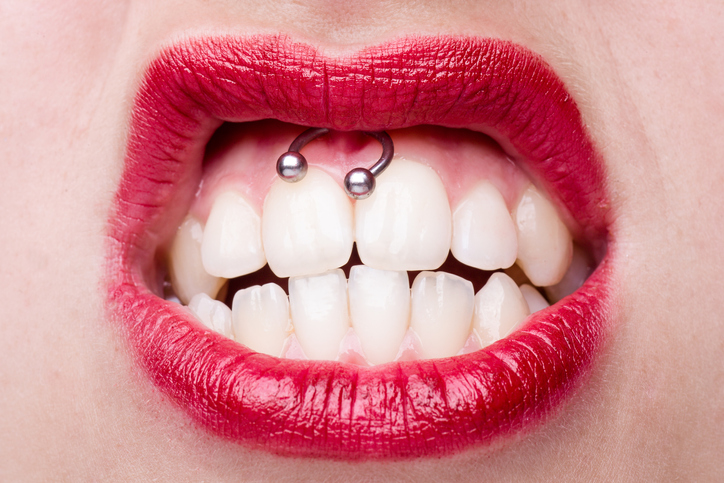
Gum piercing can be a fun, unique way to express your identity. But it comes with much risk.
Tattoos and body piercings are popular forms of modern self-expression. One body piercing that’s growing in popularity is a gum piercing, also known as a smiley piercing. The piercing is made at the front of the mouth so that everyone can see it when you smile. But the question remains: Is it safe? Your dentist can advise you on safety precautions, but this article should give you some basic information about the process and potential risks.
The Process of Gum Piercing
Unlike a tooth piercing, during which gemstones or metal grills are sealed to the teeth, a gum piercing is made through the frenulum, a small area of tissue connecting the gums to the lips. For that reason, the piercing is also called a frenulum piercing.
Your frenulum must be thick and strong enough to hold the piercing jewelry. Poor gum health may also disqualify someone from the piercing. People who wear braces shouldn’t get gum piercings, as well.
Before piercing, the piercer will clean your mouth with an antibacterial solution. A small hole is made through the frenulum with a sterile needle, and jewelry is threaded through the piercing. The initial piercing may be painful, but it’s over so quickly you won’t feel too much discomfort. Full healing takes about four to 12 weeks.
Some people may be sensitive to the material in the jewelry and may have an allergic response. To prevent a bad reaction, make sure the piercing jewelry is made of surgical stainless steel or surgical titanium. Choose 14-karat yellow or white gold.
How to care for your gum piercing
Gum piercings carry a degree of risk, namely, the potential for infection. Bacteria naturally thrive in your mouth. Introducing jewelry provides bacteria another place to latch onto and grow. The piercing site can also become infected. Pain and swelling indicate an infection, as does yellow- or green-colored pus, along with a foul smell. Anytime you notice signs of infection around the piercing site, visit your dentist for an exam and treatment.
Another risk is gum damage or recession as the jewelry pushes continuously against the gum line. Likewise, jewelry constantly rubbing against the teeth can erode enamel, making them more sensitive. Further, your body may reject the piercing adornment, causing it to fall out.
Even with these risks in mind, if you still want to get a gum piercing or if you wear one currently, you can ensure your oral health and keep the piercing intact by following some basic safety measures:
- Rinse twice daily with a salt-based solution to keep your mouth clean.
- Rinse after eating to whisk away bacteria.
- Brush your teeth twice daily with a mild, non-mint toothpaste and gargle with an alcohol-free mouthwash.
- Wear a mouthguard to prevent the jewelry from getting ripped out when playing contact sports.
- Don’t smoke or drink alcohol.
- Avoid highly acidic or spicy foods that can irritate the piercing site.
Gum piercings are a fun way to express yourself. But you should understand the potential risks. Speak to your dentist about maintaining your oral health so you can show your smiley piercing to the world worry-free.
Are you thinking about a gum piercing?
Schedule an appointment at Espire’s Colorado Springs location today! Our highly trained dentists can check your mouth to determine if you are a good candidate for a gum piercing. Or, they can help you keep your gum piercing free of infection. Don’t live near our Colorado Springs office? Find one of our other locations near you.
Colorado Springs
8610 Explorer Drive #315
Colorado Springs, CO 80920


